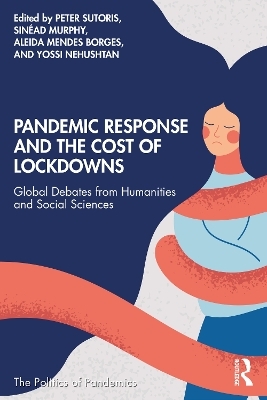
Pandemic Response and the Cost of Lockdowns
Routledge (Verlag)
978-1-032-19389-2 (ISBN)
The global response to the COVID-19 pandemic left little time for critical debate about the impact of lockdowns. Across the world, governments claimed to "follow the science", but they rarely paid attention to the humanities and social sciences. Indeed, the absence of these perspectives is symptomatic of a longer-term trend in the marginalisation of the humanities and social sciences in policymaking and public debate. This book exposes the tragic consequences of this omission in 2020–21 and demonstrates the potential for a different path in the future – a path in which we pay attention to power, complexity, and our biases. The authors establish what these disciplines have to offer in a global emergency and how we can ensure they help us avoid the mistakes of 2020–21 in the future.
This original and interdisciplinary book will be of great interest to students, scholars, and researchers throughout the humanities and social sciences, including the fields of philosophy, sociology, anthropology, law, political science, and history, as well as relevant policymakers.
Peter Sutoris is Assistant Professor in Education at the University of York, UK, and Honorary Senior Research Associate at University College London, UK. He is an environmental anthropologist. Sinéad Murphy is an Associate Researcher in Philosophy at Newcastle University, UK. Aleida Mendes Borges is a Research Associate at the Global Institute for Women’s Leadership at King’s College London, UK, where she leads the Women Grassroots Leaders research stream. She is a jurist, specialising in International Public Law (Human Rights). Yossi Nehushtan is Professor of Law and Philosophy, Founder and General Editor of the Keele Law Review, and Co-Director of the MA in Human Rights at Keele University, UK.
Introduction: The Role of Humanities and Social Sciences at a time of Crisis Section 1: Key Covid Concepts Re-examined 1. The ‘Lockdown Consensus’ in the UK and the Dangers of Performative Scientism 2. Stopping the Spread of Health 3. Pandemic Response, Cultural Anthropology and ‘The Myth of the Caring Society’ 4. Digital Society, Algorithmic Harm, and the Pandemic Response 5. Against the Logic of Immunity: Philosophy and the Epidemic Section 2: Pandemic Policy and the Global South 6. How the World's Harshest Lockdown Unleashed a Humanitarian Crisis 7. Covid-19 in Angola: Militarization of Lockdown Language and State Policy in Angola 8. The Economic Impact of Covid-19 Lockdown Policies in Argentina 9. An Analysis of the Socio-Economic Impacts of the Lockdown Policy in Ghana 10.The Covid-19 Syndemic and Lessons (Not) Learned from Past Epidemics: One Size Doesn’t Fit All Section 3: Alternative Lenses on Pandemic Response 11. The Proportionality of Lockdowns 12. Lockdowns and Intergenerational Justice 13. Lockdown Lived Experience, Illness, Power and Epistemic Injustice 14. What We Lost in Lockdown 15. Do Lockdowns Work for Women? The Gendered Impacts of the Pandemic and Policy Responses
| Erscheinungsdatum | 17.11.2022 |
|---|---|
| Reihe/Serie | The Politics of Pandemics |
| Zusatzinfo | 1 Line drawings, black and white; 2 Halftones, black and white; 3 Illustrations, black and white |
| Verlagsort | London |
| Sprache | englisch |
| Maße | 156 x 234 mm |
| Gewicht | 540 g |
| Themenwelt | Sachbuch/Ratgeber ► Gesundheit / Leben / Psychologie |
| Studium ► Querschnittsbereiche ► Prävention / Gesundheitsförderung | |
| Sozialwissenschaften ► Politik / Verwaltung ► Staat / Verwaltung | |
| ISBN-10 | 1-032-19389-1 / 1032193891 |
| ISBN-13 | 978-1-032-19389-2 / 9781032193892 |
| Zustand | Neuware |
| Informationen gemäß Produktsicherheitsverordnung (GPSR) | |
| Haben Sie eine Frage zum Produkt? |
aus dem Bereich


